
The North Kalimantan Communist Party was a Maoist communist party based in the Malaysian state of Sarawak in northern Borneo. It was formally founded on 19 September 1971. Before that, the group had been operating under the name Sarawak People's Guerrillas. The chairman of the NKCP was Wen Ming Chyuan and the party enjoyed close links with the People's Republic of China. The NKCP's membership was predominantly ethnically Chinese. The two military formations of the NKCP were the Sarawak People's Guerilla Force (SPGF) or Pasukan Gerilya Rakyat Sarawak (PGRS), and the North Kalimantan People's Army (NKPA) or the Pasukan Rakyat Kalimantan Utara (PARAKU). The NKCP participated in the Sarawak Communist Insurgency (1962–1990). On 17 October 1990, the North Kalimantan Communist Party signed a peace agreement with the Sarawak state government, formally ending the Sarawak Communist Insurgency.

The Communist Party of Indonesia was a communist party in the Dutch East Indies and later Indonesia. It was the largest non-ruling communist party in the world before its violent disbandment in 1965. The party had two million members in the 1955 elections, with 16 percent of the national vote and almost 30 percent of the vote in East Java. During most of the period immediately following the Indonesian Independence until the eradication of the PKI in 1965, it was a legal party operating openly in the country. Accused of responsibility for the 1965 army-led coup attempt, the party was banned by General Suharto in March 1966.
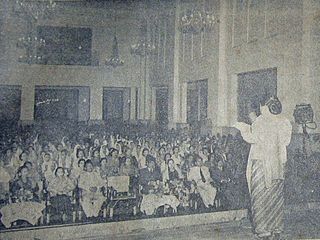
Gerwani was a women's organization founded as Gerwis in Semarang, Central Java, on 4 June 1950.
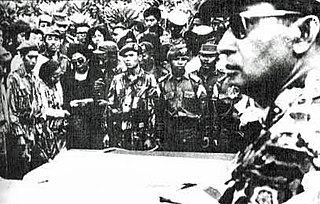
Indonesia's transition to the New Order in the mid-1960s ousted the country's first president, Sukarno, after 22 years in the position. One of the most tumultuous periods in the country's modern history, it was also the commencement of Suharto's 31-year presidency.
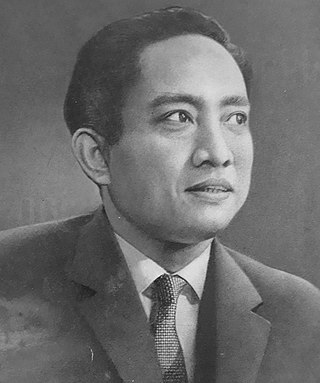
Dipa Nusantara Aidit was an Indonesian communist politician, who served as General Secretary of the Communist Party of Indonesia (PKI) from 1951 until his summary execution during the mass killings of 1965–66. Born on Belitung Island, he was nicknamed "Amat".
The People's Democratic Party was a democratic socialist party in Indonesia.

The Madiun Affair, known locally as the Communist Party of Indonesia rebellion of 1948, was an armed conflict between the government of the self-proclaimed Republic of Indonesia and the left-wing opposition group Front Demokrasi Rakyat during the Indonesian National Revolution. The conflict began on September 18, 1948, in Madiun, East Java, and ended three months later when most FDR leaders and members were detained and executed by TNI forces.

Large-scale killings and civil unrest primarily targeting members and supposed sympathizers of the Communist Party of Indonesia (PKI) were carried out in Indonesia from 1965 to 1966. Other affected groups included alleged communist sympathisers, Gerwani women, trade unionists, ethnic Javanese Abangan, ethnic Chinese, atheists, so-called "unbelievers", and alleged leftists in general. According to the most widely published estimates at least 500,000 to 1 million people were killed, with some estimates going as high as two to three million. The atrocities, sometimes described as a genocide or a politicide, were instigated by the Indonesian Army under Suharto. Research and declassified documents demonstrate the Indonesian authorities received support from foreign countries such as the United States and the United Kingdom.
The Socialist Party was socialist political party in Indonesia which existed from 1945 to 1948. The party was founded as a merger between the Socialist People's Party (Paras) of Prime Minister Sutan Sjahrir and Socialist Party of Indonesia (Parsi) of Defence Minister Amir Sjarifuddin. Sjahrir became chairman of the unified party, whilst Sjarifuddin became vice-chairman.

The Central All-Indonesian Workers Organization was the largest trade union federation in Indonesia. Founded during the period of the country's independence in the late 1940s, the federation grew rapidly in the 1950s. It was initially formed with loose connections to the Communist Party of Indonesia (PKI) and with members from other parties, but over time, the PKI became dominant in the organisation. With the introduction of President Sukarno's guided democracy in the late 1950s, SOBSI was formally recognised and given a place in the national decision-making structures. In the 1960s, SOBSI came into conflict with the Army, whose officers controlled the country's state enterprises. After the 1965 coup that subsequently produced Suharto's New Order regime, SOBSI was declared illegal, its members killed and imprisoned and most of the leadership executed.
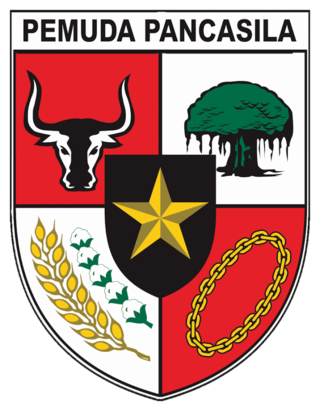
The Pancasila Youth is an Indonesian far-right paramilitary organization established in 1959. The organisation's name refers to Pancasila, the official "five principles" of the Indonesian state. Pemuda Pancasila was involved in the Indonesian mass killings of 1965–66, and supported the New Order regime of President Suharto. Its members extort money, control car parking and offer security services.

The communist insurgency in Sarawak was an insurgency in Malaysia from 1962 to 1990, and involved the North Kalimantan Communist Party (NKCP) and the Malaysian Government. It was one of the two communist insurgencies to challenge the former British colony of Malaysia during the Cold War. As with the earlier Malayan Emergency (1948–1960), the communist insurgents in Sarawak were predominantly ethnic Chinese, who opposed British rule over Sarawak and later opposed the merger of the state into the newly created Federation of Malaysia. The insurgency was triggered by the 1962 Brunei revolt, which had been instigated by the left-wing Brunei People's Party in opposition to the proposed formation of Malaysia.

Following the military take-over in Indonesia and the massacres of 1965–66, the Albanian capital Tirana became one of the main hubs for exiled members and sympathizers of the pro-Chinese wing of the Communist Party of Indonesia (PKI). According to prof. Justus van der Kroef there were about forty Indonesian communists staying in Tirana in the early 1970s, around half of them organized in the Persatuan Peladjar Indonesia. The Tirana-based group often acted as spokespersons of the party.

Wikana was an Indonesian minister and independence leader. He was one of the youths who forced Sukarno and Hatta to declare independence immediately after the surrender of the Japanese. He was the first Indonesian Minister of Youth and Sport. He was a member of the Indonesian Communist Party. Sometime after the 1965 coup d'état attempt, he was arrested and went missing. It is supposed that he was one of the assassinated in the Indonesian mass killings of 1965–66.

Arudji Kartawinata was an Indonesian politician and military officer. During the Indonesian National Revolution, he was the first commander of the 3rd Division, predecessor to the modern Siliwangi Division. Politically, he was initially a member of Masyumi before later re-forming the Indonesian Islamic Union Party. He served as the chairman of the People's Representative Council for three years between 1963 and 1966.

Asmu, whose birth name was Asmoe Tjiptodarsono, was a leader, theoretician, and chief agricultural expert of the Indonesian Communist Party (PKI) and head of the Communist-affiliated Peasants Front of Indonesia in the mid-1960s. He was killed during the Indonesian mass killings of 1965–66.
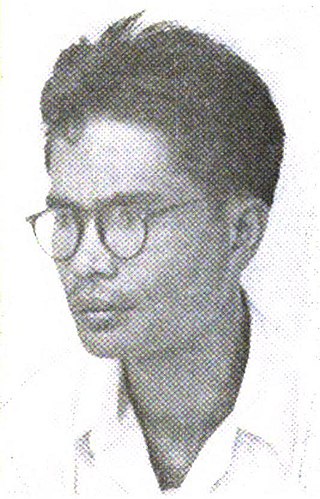
Peris Pardede (1918–1982) was an Indonesian politician who was a key figure in the Communist Party of Indonesia during the Sukarno era. He held various roles, including editor of the party magazine Bintang Merah, representative of the party in the Provisional House of Representatives and the House of Representatives throughout the 1950s and early 1960s, and Politburo candidate in 1965. After the party was banned in 1965, he was put on trial and spent his final decades as a political prisoner of the Suharto regime.

Pemuda Sosialis Indonesia was a youth organisation that embraced the principles of socialism to uphold the Republic of Indonesia based on popular sovereignty. Pesindo was particularly closely associated with youth leaders in 1945. The role of youth figures such as Wikana and Chaerul Saleh, Soemarsono and Krissubanu, Ibnu Parna and other figures shaped Pesindo's identity, namely a revolutionary youth organisation against colonialism and fascism.

Raden Oetomo Ramelan was a former Mayor of Surakarta who served from 17 February 1958 to 23 October 1965. He was known as the only Mayor of Surakarta who came from the Indonesian Communist Party (PKI). Oetomo was sentenced to death by the Extraordinary Military Court (Mahmilub) on 22 June 1967, and shortly after that, he most likely faced execution.
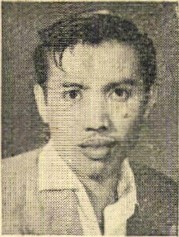
Sukatno Hoesni was an Indonesian politician. He was a member of the Indonesian Communist Party (PKI) from East Java who served as a member of the House of Representatives (DPR) from 1956 until 1965. He became the youngest member of the DPR when he was inaugurated in 1956.

















